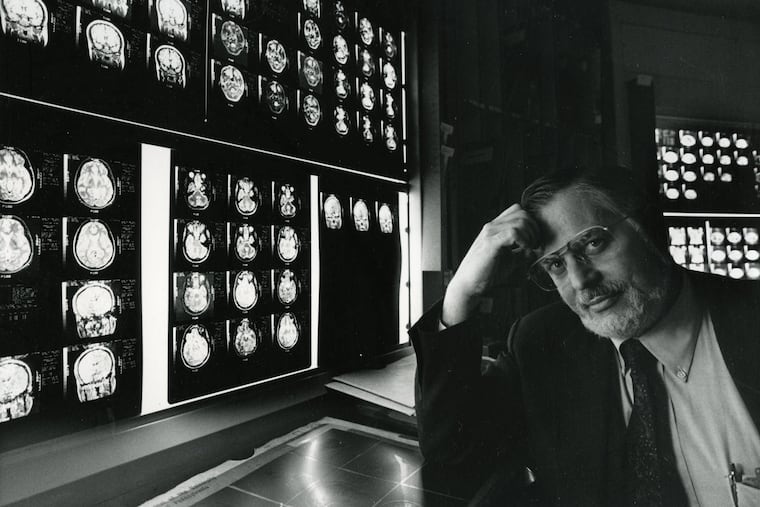Robert A. Zimmerman, internationally acclaimed neuroradiologist at Penn and CHOP, dies at 82
He received the Richard D. Wood distinguished alumni award in 2014, and CHOP created the Robert A. Zimmerman endowed chair in pediatric neuroradiology in 2018.

Robert A. Zimmerman, 82, of Philadelphia, a celebrated neuroradiologist who helped pioneer the use of magnetic resonance imaging for the brain, and a popular teacher, mentor, and colleague, died Tuesday, Feb. 23, of kidney cancer at home.
Dr. Zimmerman, a biology major at Temple University in 1960, narrowed his expertise to neuroradiology — using images to diagnose abnormalities in the nervous system, spine, head, and neck — while at medical school at Georgetown University and went on to a 46-year career at the Hospital of the University of Pennsylvania and Children’s Hospital of Philadelphia.
Popular as a teacher to young doctors and as a colleague to the broader international medical community, his kindness, sense of humor, and professional honesty were personal hallmarks.
When he received the Richard D. Wood distinguished alumni award from CHOP in 2014, one former student, who went on to his own impressive career, said he felt “like a small chip off a great block” after studying with Dr. Zimmerman.
Another former colleague said, “I am a product of him.”
In presenting the alumni award, Cindy Christian, an attending physician at CHOP, noted Dr. Zimmerman’s “lasting contributions to medicine” and said, “He has been an inspiring teacher and mentor to generations of radiologists.”
Colleagues credited Dr. Zimmerman with affecting the lives of thousands of people due to his research and innovation, practice, and advocacy for modern and effective medical procedures. He served as an expert medical witness in legal matters that determined public policy as well as individual case verdicts.
“He was the most honest person I have ever met,” said his wife, Dianne Zimmerman. “He always wanted to do things the right way.”
Dr. Zimmerman lectured in more than 40 countries, published nearly 500 papers, edited textbooks and other publications, was connected to many research grants, and served on dozens of academic and public policy committees.
He won numerous awards, was a consultant, a member of many professional societies, and a visiting professor in, among other places, Australia, South Africa, Canada, England, and Italy.
The Robert A. Zimmerman endowed chair in pediatric neuroradiology was created by CHOP upon his retirement in 2018.
One of three children, Dr. Zimmerman was born in Philadelphia on June 20, 1938. He grew up in Strawberry Mansion, and graduated from Central High School, Temple, and Georgetown University School of Medicine.
He interned at Georgetown University Hospital, and completed a radiology residency and fellowship in special procedures at Penn. Due to an ROTC commitment, he spent three years in the Army and, as a major, was in 1972 the second-highest-ranked Jewish officer in what is now the Army Central.
He became assistant professor of radiology at Penn in 1972, and, in a rapid ascent, was promoted to professor of radiology and professor of radiology in neurosurgery in 1981. He moved to CHOP in 1989 and became chief of pediatric neuroradiology and MRI.
“He loved teaching,” said his daughter Rachel Zimmerman. “We sort of shared him with everyone. He was a mensch.”
Dr. Zimmerman, known by many as Dr. Z, met his wife when they were young camp counselors. They married in 1960, and raised Rachel and her younger sister, Sara, in University City. He told his wife he wanted to live close to the hospitals so he could get home in time for dinner.
He taught ceramics at summer camp and was a photographer with his own darkroom. He collected historical maps and medical drawings, and his passport was filled front to back due to his international popularity.
He was passionate about the arts, liked to make wine, putter around the garden, and read with his family.
“He had a joyful sense of humor,” said daughter Sara Zimmerman. “You could hear his laughter wherever he was.”
In addition to his wife and daughters, Dr. Zimmerman is survived by two grandchildren, one sister, and other relatives. A brother died earlier.
Services are to be held later.
Donations in his name may be made to InLiquid, 1400 N. American St., Studio 314, Philadelphia, Pa. 19122.